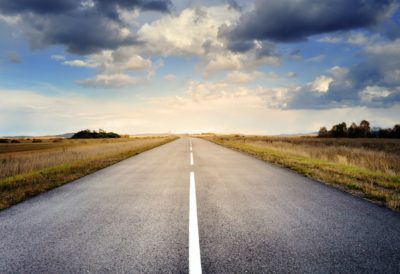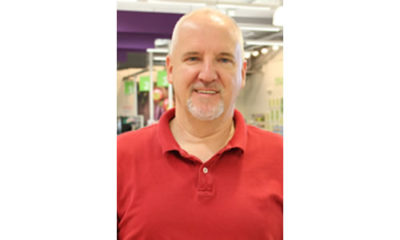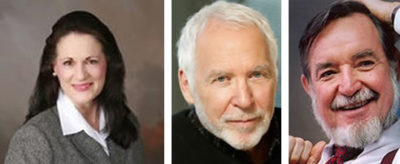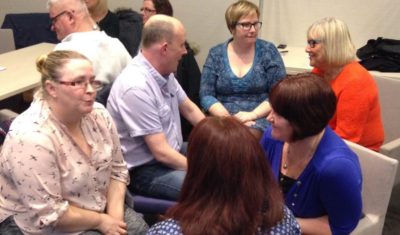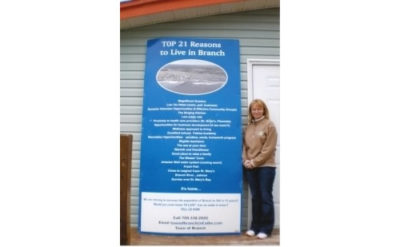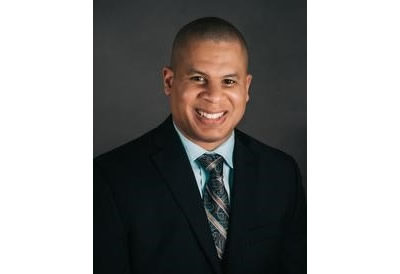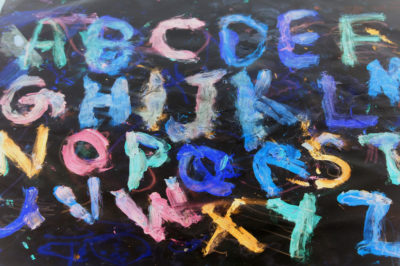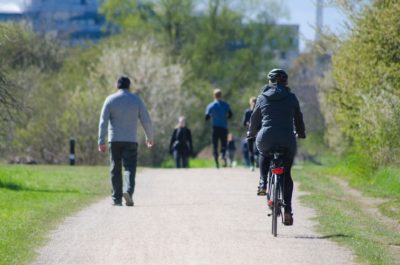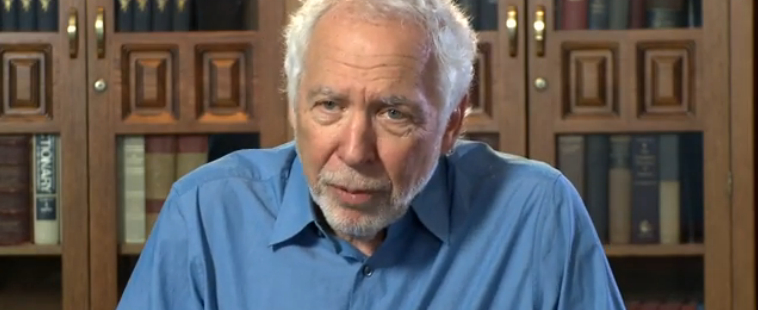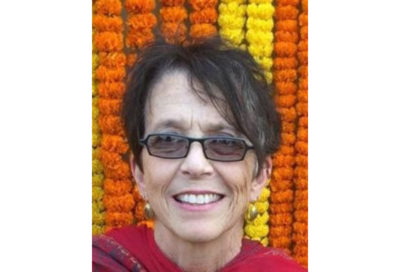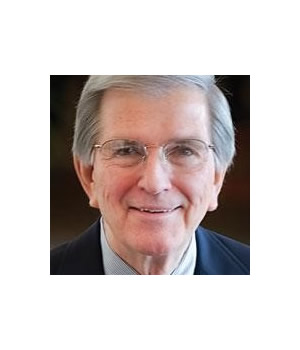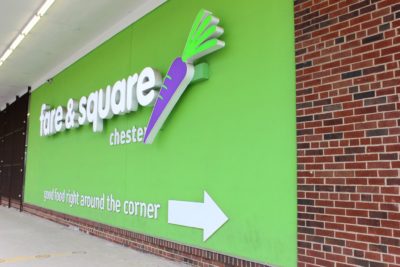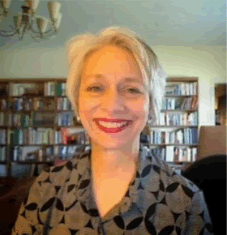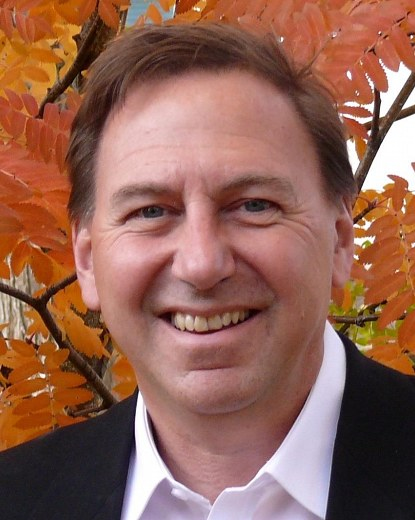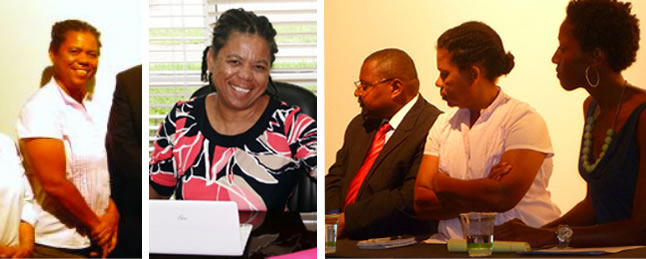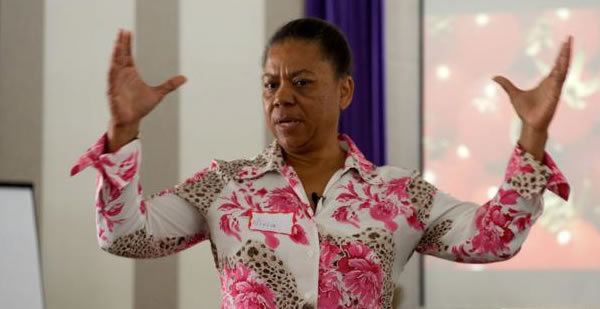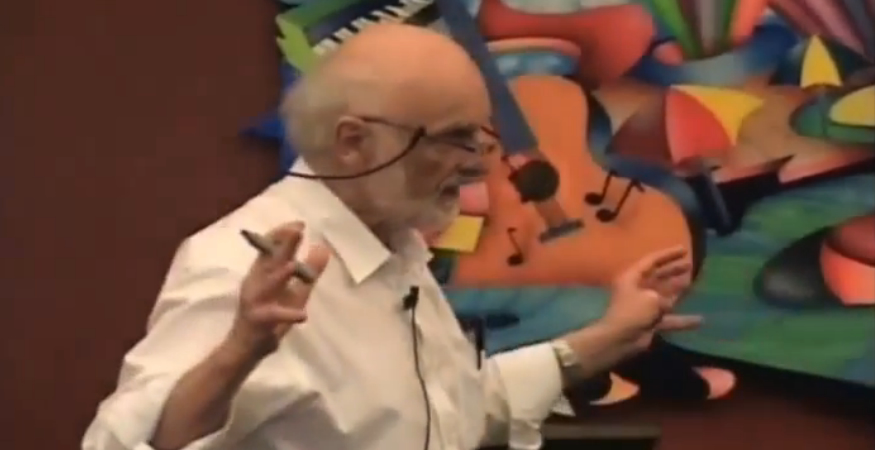Tag Archives: Economy of Well Being
Ground-breaking grocery store
Fare & Square VP of Retail Operations Mike Basher shares insight into the Chester, Pennsylvania supermarket formed by a Philadelphia food bank (Philabundance). Fare & Square is the first nonprofit grocery store of its kind in the U.S. bringing healthy, affordable food to what was once a food desert.
Operating in a low-income neighborhood, the store takes an interest in sharing how to prepare healthy food for low cost. Competing for low prices on meats, offering a special carry cash rewards system and educating customers on different choices are some of the ways Fare & Square is uniquely serving its community.
Don’t miss listening to the full conversation and hear how this model could be replicated across the country.
Listen:
Quotes:
“We’re trying to provide families in this community fresh affordable healthy foods that they can get right in their own back yards.” – Mike Basher
Related Links:
Fare & Square (store website)
Chester’s Nonprofit Food Market Tries to Square Mission with Bottom Line (online feature by Laura Benshoff for WHYY)
Chester Supermarket, ‘Fare & Square’ Changing Lives in Community (news clip by Matt DeLucia, NBC10 News)
Engaging Neighbors Opens Thinking for Health Professionals
Lisa Gale Hadden, Michigan Area Health Education Center executive director, has learned that when medical and nursing students go to neighborhoods to talk with families about their health they discover untapped resources and assets.
“They really saw the value in connecting to the neighborhood health wisdom and used that to become better health care professionals. It changed their care planning for their patients.” Students asked appreciative, open-ended questions to discover how neighbors define their own health in their own terms. Twenty years later, the students have who are now practitioners are still talking about it.
In this conversation, Lisa – who acts as a bridge between medical and community knowledge in her work – shares more about this experience with John McKnight and Peter Block.
Listen:
Quotes:
“The more that there’s income equality in a community, or city, or town the healthier people are.” – Lisa Gale Hadden
“Our advice (to students) has always been . . . you’re there first and foremost to just be a neighbor. I think our students really began to see that as they developed relationships with our neighbors.” – Lisa Gale Hadden
Cormac Russell: Health Beyond Healthcare
The Good Life Conversation
Small Town Invites Younger Generation to Come Home
Former mayor Priscilla Corcoran Mooney talks with John McKnight and Peter Block about community life in the small coastal town of Branch, Newfoundland, Canada. In 2007, Branch town council held a “come home” reunion-type event and listed the “Top 21 Reasons to live in Branch,” attracting national media attention. Branch citizens are known for their strong sense of belonging.
Priscilla shares about initiatives connecting people and contributing to well-being, such as a community dinner where photo slideshows spark conversation and a corner store with healthier food options.
Listen here:
Related Link:
Top 21 Reasons to Live in Branch
Visions of a Just Economy
Jubilee is an attempt to be a “ray of light that pierces through the darkness of fear,” says Adam Clark. In this audio recording, Adam, Associate Professor of Theology at Xavier University, talks with Peter Block about the modern vision of Jubilee – a biblical metaphor based on a period of economic re-distribution where slaves are set free, land is returned to its original owners and debts are forgiven.
Adam talks about the ideology of consumerism as a form of religion, the politics of disposability, distributing ownership and more in this radical conversation. Listen here:
Quotes:
“What’s so kind of remarkable about the consumer religion is that it’s not attached to any place. It’s all over. Any place is interchangeable . . . . The religion is something that thrives in homogenizing global culture.” – Adam Clark
“A beloved community is where everybody has some control over their economic lives and participates in the economy. That’s just never happened.” – Peter Block
Related Links:
View these videos of Adam Clark in conversation with Peter Block:
https://www.restorecommons.com/jubilee-professor-adam-clark/
https://www.restorecommons.com/professor-adam-clark/
In Search of the Tie That Binds
Neighborhood initiative impacting social health
In Rochester NY, Deborah Puntenney and her network are transforming the conventional wisdom about how foundation money can produce resident health outcomes. Eight years into the project with the Greater Rochester Health Foundation they are investing in the social determinants of health through grassroots, place-based and resident-driven efforts. This is not about more health services.
The foundation and a group of its grantees formed the Neighborhood Health Status Improvement Initiative, where four neighborhood groups are using Asset Based Community Development to work on health-related issues.
Deborah shares examples from an inner-city community in this conversation with Peter Block and John McKnight:
Related Links:
dpuntenney.com
thegrhf.org/funding/neighborhood-health/
photo courtesy Pixabay.com
Changing the Neighborhood Conversation
Part of Jubilee work is to change the narrative away from the predominant culture where people who don’t have wealth are considered broken. Peter Block says reconstructing our language and thinking involves changing how neighborhoods are measured.
He’s working on an economic neighborhood vitality index that measures the economic productivity of citizens and neighborhoods that are traditionally called broken, poor or untrained. Questions such as: What are you good at? What do you make/fix/care for? Where do you get money if you need to borrow it?
“That’s the real Jubilee idea,” says Peter, convener of the Jubilee Circle. “It’s not we’re going to write out a check and forgive the debts. It’s that we’re going to re-construct the narrative of who these neighbors are.”
He also shares about the need to welcome and get connected with people who are strangers. Peter was one of the speakers at The Economics of Compassion Initiative’s “Sanctuary as Jubilee” Community Forum and Conversation. Listen to more:
Upcoming Community Action and Health Discussion
Citizens and local democracy: a conversation with David Mathews
David Mathews shares the story of a community where the schoolhouse’s paint was falling off. When a group of neighbors got together and repainted the school the purpose wasn’t about getting paint on the walls – but to demonstrate when people get together they can make a difference.
The Kettering Foundation’s primary research question is “what does it take to make democracy work as it should?” Research is conducted from the citizen’s perspective and explores what people can collectively do to address problems.
David shares these ideas and more in a conversation with John McKnight and Peter Block. Listen here:
Join Feb. 21 Good Food for Everybody Conversation
Innovative Funding for Citizen-Initiated Change
Janis Foster Richardson
Janis Foster Richardson explains the program Grassroots Grantmakers, which is a ‘network’ of people that are willing to provide funding to initiatives that create community. She looks at what motivates people to bond together, and reveals perhaps surprising results of what has and has not gotten desired results.
The Meaning of Genuine Wealth
This is a discussion of a real alternative economy. Mark is an economist who has figured out how to measure genuine wealth on any scale. From neighborhood to provinces and countries. Shifting what we measure transforms how we think, how we speak, and what we value. He offers the tools and the strategies for transformation on a serious scale.
For ten years following the 2010 publication of their book The Abundant Community: Awakening the Power of Families and Neighborhoods, John and Peter hosted conversations with neighborhood activists on their community-building work. All their ideas are still at work and continue to be influential for anyone engaged in creating the future in the present. The transcript here has been edited for length and clarity.
The Meaning of Genuine Wealth:
Conversation with Mark Anielski
December 10, 2014
Peter Block: Welcome John and Mark and all those joining in.
To begin, Mark has changed my mind and that is the only way I can introduce him. He is a traditional economist who studied economics and has opened the world to me. It is one thing to complain about the economy and to see what is wrong with it; it is pretty easy to read about what you see on the headlines every day. Mark has really inverted our thinking about that and says the measures that we are using are wrong. That happiness is a possibility in the world and you see that idea becoming popular.
Mark once invited me to a conference of economists and for two days I was just dazzled. People were telling me things that I just didn’t know. I didn’t know that there was a state bank in North Dakota. It was public institution shielded from the highs and lows of the economic mainstream. I didn’t know that the national debt is mostly interest that we pay to the private sector. It was just amazing generosity, Mark, and thank you for inviting me there. Mark is a teacher of mine and we have become friends. Mark, I welcome you and thank you for being here and what you are doing.
We hear a lot about the new economy. So, I thought, as an opening, you might just give us a headline and why now you think this is becoming such a subject of public conversation.
Mark Anielski: Well, I think the so-called new economy is, I believe, so important today because we are on the verge of many significant shifts in the world system. We have climate change. We are on the verge of a significant debt crisis that I believe we will soon be a part of and it will be worse than 2008. The questions are, Why do we continue to measure progress using things like Gross Domestic Product since World War II? Why do we continue to have a debt finance system or even more pressing issues today?
We have an obligation, I believe, today to re-establish a deeper understanding of the word economy, which means helpful and stewardship, and to find new solutions to our intractable debt crisis. I call it a form of debt slavery and to free us from that would mean to orient our economy to what I am calling an economy of well-being.
That economy of well-being can be properly and effectively navigated if we re-establish the foundations that capitalism should be built on, which is the notion of what I call Genuine Wealth. I believe we can re-establish a new economy based on these new fundamental principles that well-being becomes the ultimate bottom line and an objective and best interest of all society.
Peter: I think if you could just say a little more about when you say the word well-being what goes through your mind? Can you make that more concrete for us?
Mark: Well-being in the work that I am doing with First Nations People constitutes spiritual, mental, physical, and emotional well-being. We have had others, of course, from Aristotle and onwards. Maslow.
One of the foundational contributions to a happy life and well-being begins with sufficient material needs, which is what Thomas Aquinas wrote about a long time ago. Building on Aristotle, that is followed by good health and physical and emotional health. Relationships are the fundamental building block of a happy community, which is something that we can impact. Finally, there is self-actualization or happiness. These are what I would call the building blocks of well-being. All bounded by a healthy and natural environment. Healthy ecosystems are fundamental to a thriving and flourishing community.
Peter: What seems stunning to me is that you are taking questions of happiness, spiritual and physical well-being, and including them in the domain of economics. Like you said that the original meaning of economics was household management, but you are saying that the economy ought to deal with spiritual questions or health questions or life-style questions. Who is interested in this? Who is your audience for this kind of thinking?
Mark: Well, I seem to have a very broad audience. Last week I met with the Minister of Health Policy and Chief Medical Officer here in Alberta. The whole theme of Alberta health today is wellness. So, they asked me how are you measuring wellness?
I said that we are doing exciting things with people like Peter Block and John McKnight and Carol Lawrence and going into communities and neighborhoods and talking to our neighbors about what brings their life meaning. What are their gifts and skills? Asking them their subjective opinions about their expectations of their well-being for themselves, for their work and for their children. Then marrying that with objective metrics that we collect regularly anyway. We collect all kinds of social economics statistics and health statistics. We need to marry the experiential information of the self-ratings of well-being and the objective data.
Then we begin to understand at the household level, but also the neighborhood level, the community level, and the civic and municipal level. What does well-being look like? How is it distributed? Is there inequity in the condition of well-being? What do we do about it with respect to policies and budgets and capital operating budgets? I am getting residents and people like city managers to understand that this is a new time and that well-being–based budgeting is a new frontier. It’s not going to be easy, but I think it’s an opportunity worth exploring in a serious way.
John McKnight: I’m wondering if you could help us by being as specific as possible and give us a couple of examples. If you are interested in objective metrics and you’re focusing on the question of happiness and well-being broadly, can you describe what you actually are measuring and quantifying within that framework?
Mark: Within the Genuine Wealth framework that I have developed there are five asset classes or domains. I have an accounting background so forgive me for bringing a balance sheet into the conversation.
The whole basis for accounting is measuring what matters. So, what are the assets of a community? In tangible terms on the human assets side, what are our skills, aspirations, and even our spiritual well-being? We can measure those and develop survey tools to do so. On the social capital front, we talk about belonging and measuring subjective perception and trust of each other, businesses, and government because trust is the most precious of all assets in my opinion. They go undervalued in conventional balance sheets. We call it goodwill, but we undervalue goodwill. On the natural capital side, we measure the quality of lands, water, wetlands, and ecological services, and we put monetary values on those and then we don’t count infrastructure financial costs, money, and debts. Then there’s my favorite word, equity, which is the distribution of well-being.
Once we establish these accounts we have basically established a well-being assessment and checkup inventory and then we can generate indicators such as the many different ones in Canada: The Canadian index of well-being we developed in the last ten years, or the Genuine Progress Indicator, which is an adjustment to GDP, where the full cost of social and environmental degradation is taken into account. So, we begin to formalize this accounting system by re-establishing a community balance sheet, which shows the assets, the liabilities, the equity, a proper income statement, which shows not just GDP, but what is actually driving GDP and what is actually degrading it and what is the depreciation on human and social capital.
All of these things are as tangible as apples, and you can find on my corporate website work that I have been doing over the years with the city of Edmonton. Trying to teach economists how to budget based on a well-being index and to connect changes in taxes to the well-being index of Edmonton. That is one of the things that we are pursuing and now narrowing down to the neighborhood level, to the really granular level of living.
John: You say one thing that you are interested in measuring is social capital. A lot of the work in the ABCD world is focused there. There you can focus on belonging and trust. Can you describe how you measure that? What is it that you are trying to quantify as an indicator of increased social capital, belonging, and trust? Give us some examples.
Mark: At the municipal level we have developed a survey tool that is again grounded in Maslow’s model of health, relationship, and happiness. We ask people to rate their own expectations of belonging or their sense of alienation perhaps because of race, gender, and sex. We ask them to rate their levels of trust of neighbors, family, businesses, workplace, and we get some really interesting results because we are not just asking opinions, but we are also asking, What are your own expectations and do you feel you are meeting those expectations?
What we get is a really robust breakdown of levels of expectations and even thresholds of where we think people are living below their expectations and below what we think people should be living at. We can show that across zip codes, postal codes, age, and sex –– whatever. That is pretty exciting.
That is what I mean by the community level. In the corporate setting we are helping companies to understand that for most corporations today their most important assets are relational aspects, intangibles, trust, and even workplace happiness. Can we quantify that? Absolutely. We can go and ask clients about their relationship is with a firm. With Coca-Cola or whoever it is. What is the level of trust? That subjective rating translates into your financials. Can you book trust as an asset? I think so. Coca-Cola says their brand is 28% of their balance sheet. So, that is why Warren Buffet likes Coca-Cola. He knows that whether you like Coke or not, it is counting its intangibles in a wise way.
John: Mark, if you were thinking about your measures then in social capital, do you have a way of keeping and doing that through time? That is, what it would tell us the most –– not where we are now, but what kinds of changes are taking place? Then what ability is there to try to see what are the determinants of those changes? I’m just wondering whether you have got that structures like that at Edmonton or someplace.
Mark: I would have to say I think we haven’t got the traction that we would like yet. So, we are just planting seeds at this stage, and thank you for your work and Howard Lawrence’s pioneering work in Edmonton.
Our proposal, for example, to the city of Edmonton is taking what Howard is doing on measuring the assets in a community and marrying it to an ongoing well-being survey, which would be live all the time. People would be continually self-rating their well-being. Gallup is measuring the happiness of Americans every day. Thousands of Americans get polled every day. So, what is stopping us from thinking about it? It might be an app that says, Have you filled out your well-being rating? How happy are you in your neighborhood? That would be a fun way. Even city councils would be enlivened, I can tell you, if they were comparing their wards based on real input. Dynamic, longitudinal input. That’s one proposal.
The second is to introduce a well-being census instrument. So, when the population census is done you get some of those households that participate with Howard voluntarily to go further, say, to fill out a longer well-being census form to give some objective statistics so we can now compare your subjective ratings with your household income. Your age. We can even track you through time. We can customize and give them a gift certificate at their local restaurant or whatever.
I think cities need to and can get into this game of well-being census-taking and finance, probably, for less than a Starbucks latte per capita to keep this whole thing working. That’s what we are proposing.
John: I am also wondering now as you are setting up this method of measurement –– and it’s very creative; it is telling us mostly about the experience and sense of well-being, plus some more specific things –– I am wondering if you had this information, what are the policy possibilities that would grow from that? That is, if I am in Edmonton and it’s four years out and I’ve had two censuses and I can see some shifts in these measures, the question then might be –– if I’m the mayor, city manager in terms of local government, even at the provincial level –– What do you see as the policy options that might grow from what you have learned?
Mark: I will speak from my experience in the area of performance measurement in the Alberta government and the Finance Ministry.
We oversaw the whole performance measurement system for Alberta in the mid 1990’s. A lot of these ideas come from that experience. If we were to use this information, first of all, the theme is measuring what matters to well-being, so the question is, Are we measuring what matters? Are chief economists measuring what matters? Does the CFO have a balance sheet for the city? I could tell you that all public accounts do not have a formal balance sheet, and it is unbelievable to think that Warren Buffet would not be upset if Coca-Cola did not have a balance sheet.
What we want to do here is establish a genuine balance sheet for the community’s assets. That should guide budgeting, capital, and operating decisions. It can guide community services in terms of which neighborhoods are flourishing objectively and effectively and why. We got curious about whether we could begin to invest in improving well-being conditions and ensuring the distribution of well-being more evenly across the neighborhoods. Can we demonstrate a well-being impact on policies and programs? Absolutely. In fact, it is incumbent on us as public officials to do so.
Now, politicians would love to know and demonstrate to citizens that their taxes are going up 3%, but the Edmonton well-being index went up 2% last year. I have shown this to the city and council and said that their well-being index is going up and, yes, taxes are going up, too. I am not saying there is a direct correlation there, but this is good news for any politician. So, we look at the practical applications of the work.
I would go as far as saying that at the neighborhood design level, we know that the most vibrant neighborhood in Edmonton is my community of Strathcona and why? Because people say it is walkable. Ironically, it is part of Edmonton that stopped growing in 1913 because it was amalgamated with the City of Edmonton. The buildings now are still in history and have become an asset, and it is a walkable and desirable place to live.
So, then I am curious, as an architect, whether we can think about well-being by design. What makes for the highest walk-score community? Can we attach well-being to walk-score, subjective well-being? And now, wow, the real message is you should live in this neighborhood because they have the best walk-score and the best subjective self-rated well-being index.
Peter: You are also measuring neighborliness. The new urbanism talk is about mixed use and walkability. You are going deeper than that. You are talking about people’s relationship with each other. Their trust in each other. It may be that in some of the most beautiful and physical neighborhoods people might be surprised at what happiness is really like.
Mark: That’s right. I come at this from a very nerdy accountability. I love accountability and I know that sounds weird. We are stewards of God’s grace. So, we have a responsibility to be accountable for the funds we expend and the effort we put into life. I think that we can do this and I don’t think this is beyond the realm of this new economy.
Peter: What about as an individual? You mentioned the term debt slavery. Could you describe what you mean by that? How your thinking of this economy might come to terms and shift that in some way?
Mark: Well, this is happening in England right now: Not since 1844 has there been a conversation in the British Parliament about the nature of money. These members of Parliament have realized, like I did many years ago, that the government creates the money on behalf of the people. The banks just serve as a financial intermediary.
The truth is that 98% of our money supply is created in the form of debt when banks issue loans. The United States right now [in 2014] has 60 trillion dollars in debt. Since World War II debt has doubled every seven years. Isn’t that amazing? The Jews said to forgive debt every seven years. In seven years’ time the United States debt will probably hit 120 trillion. It is now consuming 60 trillion; it is now taking about 35 cents of every dollar an American earns or spends because there is debt embedded in everything.
Most of us have no idea. We are debt slaves, and that is true globally. Now, the challenge is, what do you do about it? I don’t know. It may collapse because right now the interest payment in the national debt in the United States exceeds the military budget. That is not an official number because they use funny words like net interest.
So, think about it. A third of our lives, our working lives, will be spent paying for interest on debt which would be completely unnecessary if we actually adopted Ben Franklin, Abraham Lincoln, and Andrew Jackson’s ideas, which is for the government to create money for the people without cost, without usury, without mortgages, which is a debt pledge.
That is my tough-love message. Now, can we move toward the debt free system? Absolutely, that is why I was in London, England, and the House of Lords. I said, We can do this. It would take an act of courage, but the problem is that there is just systemic ignorance. If Parliament in London is only beginning to understand this and has never debated this since 1844, imagine if that debate happened in Washington.
John: Can you weave the idea of savings into this question of debt? Do you look at savings positively? The whole notion of decreasing your consumption and increasing your savings is something that fits in this framework?
Mark: It’s part of a circular problem. Although I would say to anyone listening, Get out of debt if you can. Do not incur more debt. We are debt slaves. Savings is just a game for the investor. Our after-tax, usury money is in accounts, which generate interest. The richer we are, of course, and the more financial assets we have, we are actually getting 2% or 3%, whatever, from our neighbor. So, the whole system is a systemic system of usury.
Yes, savings is great if it is teaching you something about good financial management, like not incurring ridiculous levels of debt, which are unsustainable anyway. Of course, I would love just to reboot the whole computer and start again. Unfortunately, I think it’s only going to come upon us by catastrophe. Not by courageous acts of government to restructure the world financial system, which actually needs to happen desperately, but I’m not convinced that is going to happen.
So, savings is great, but understand it’s all a part of system of interest-based money. I know that there is one caller who is asking about a guaranteed income. What would I do under the Genuine Wealth model? Which is like what Abraham Lincoln said: if the creation of money can be done by governments without cost why wouldn’t we institute a living wage ordinance, which would ensure that nobody goes to sleep at night feeling anxious about tomorrow because they would least know that they have $15.00 an hour to live off?
I don’t want to be accused of being a Communist here, whatever that means. We can create enough money to finance our economy. To be the best and most flourishing economy possible. You can adjust the cash flow on a daily basis and leave enough for innovation and entrepreneurship. Make sure that no American community goes to sleep at night anxious about tomorrow. Most of our conflicts are about money anyway. That my vision and that’s possible. I know it’s possible.
Peter: What would this mean? And say more about the individual. How might I change? First thing you said is get out of debt. I assume then you think I should not have a house mortgage.
Mark: It’s impossible not to have education or housing debt. That’s the reality. So, on the individual level, first of all we need better financial literacy. I mean the fact that very few people even know about the money system. I mean younger people. You and I know that you can talk to young people in their 20’s and they have watched movies so they know a little bit about the money situation today ––how it’s like a big scam or a big Ponzi scheme –– but what to do about it?
I’ve been exploring things like what Howard is saying: Okay, given the situation, we are debt slaves and who is going to call us out of slavery? As Walter Brueggemann said, an we leave Egypt successfully? I best we can do is create awareness among ourselves. Maybe become each other’s best bankers by actually lending money to ourselves. Maybe through church communities.
I said that to Howard’s Baptist church years ago. Today we can create our own bank. Right now. We could lend money to each other without interest. I call it “interest expectations.” We give without expectations of return because we give to our neighbor who has financial need now. We forgo the expectation of interest that would accumulate in our savings account, but we have helped our neighbor. We are rich in cash. We have so much liquidity and most of it is tied up in speculative finances and stock. Stocks themselves are a joke and not a genuine investment. So, let’s think about becoming each other’s bankers. Starting with more pure lending programs that work locally.
Those are some of the things I’m working on. There are too many things to get done. Again, all of these ideas and practical solutions are right there.
Peter: What do you think of the cooperative movement, the co-ops, in terms of credit unions? That was a strong movement for a time. A lot of them in Cincinnati are for companies’ savings. When you said I could create my own bank somebody asked on the chat, How can we help support your work? So, one of the answers is, why can’t we create our own bank? That sounds like a pretty exciting idea. I didn’t know I could do that. I thought that I had to be rich to do that.
Mark: No, you don’t. In fact, I tell people that creating a credit union takes almost nothing in terms of cost and maybe paperwork. To create a charter bank costs about 5 million in Canada, and that’s to get the paperwork done. The interesting thing is, once you pay the bank you can start issuing loans at one hundred to one for every dollar deposit and then you can issue a $100 credit. That is the mystery of banking.
Peter: I can start a bank with $1,000?
Mark: Yes.
Peter: I put it in the bank, and I can start loaning out $10,000 to people?
Mark: Yes. It’s a legitimate charter bank license to create money out of nothing. In fact, they use the word nihilo, which means to create out of nothing. So, look at the credit unions, I would say, or the public banks that North Dakota has. If we are going to play in this game at least support local credit unions.
I have argued that local credit unions are unfortunately playing the same game as the banks. They are also practicing usury by charging interest on loans and paying interest on deposits. Now there is only one bank that I know of in the world that is non-Islamic –– under Islam you are not allowed to charge interest and that makes it very difficult for Muslims to live in our western banking world –– that does not charge or pay interest. In Sweden there is a bank called the JAK Bank, which is the only bank approved by Islam; it’s a western bank and charges no interest on loans and pays no interest on deposits. I have studied that bank and I have compared with the biggest credit union in Canada, where they say, I don’t get it, Mark. How do we make money? I say, You don’t get it, because this bank doesn’t need to make money; the benefits are to all the members who won’t work for interest. You are operating it just like any business. You are recovering your costs by other means. Again, I have had conversations about starting one of these in Edmonton, but a lot of bankers still say, I don’t get it.
Peter: How do I get paid if I am working in the bank?
Mark: The payment to the people who work in the JAK Bank is through what is called a loan fee, which is roughly 2% of the value of any loan over a 40-year history of this bank. So, they are recovering their operating costs and it is no different from a lawyer’s fee. You are paying for the services of a financial institution. You are saving in trust on the loan. Your kids are going to school without interest on the loan. It is a fascinating system, and it was not designed by economists. It was designed by engineers who understand “glow.” It has to glow. I cannot stagnate; that it is when it becomes putrid. We fight about it.
Peter: Very exciting. Tell me again the name of the Muslim bank where this is working?
Mark: It’s not a Muslim bank. It’s a Swedish bank. It’s called JAK Members Bank. It’s on my website. It stands for Land, Labor, and Capital. That’s what JAK stands for.
Peter: That’s amazing. So, the future really is here, isn’t it?
Mark: We are just stuck in a mind-set.
Peter: Mark, you talk about the accounting instincts that you have. Talk a little bit about the faith community and the spiritual dimension of this. What does this mean for the faith community? How might they, if they got serious about it, get interested? The ministry is what you are engaged in. Can you talk a little bit about the faith side and the way it occurs to you?
Mark: I was raised Roman Catholic. To tell you a little story: I was about to get on a plane to Rome to see the Pope and then head to the Vatican Bank to declare international Jubilee and re-resurrect the teachings against of the use of usury. I would invite Muslim and Jewish brothers to join us, and probably Buddhists would understand, because this is very much part of our Abrahamic teaching. Moses received the teaching from Mount Sinai that you should not charge interest on debt. You should have Jubilee. You should honor the Sabbath. Every seven years debts should be forgiven.
These were the teachings that the Jews had before they went into exile in Babylon. The question is, did they ever live those teachings after their release from captivity? Every 49 years wealth was supposed to be redistributed to the Twelve Tribes. We are now 49 plus 49 years after the 1917 Balfour Declaration. If you look over time, you see patterns of seven. In 2008 was the last seven period and we [came up] up on the next seven in 2015. So, I’m calling on church leaders to say, Okay, so what do we do? What happened if the Jews forgot the Sabbath for seven years? It is what they call a shmita. Something would happen. Something would befall Israel.
So, we have a responsibility to ask about the tradition of the Creator giving us everything with abundance, like Moses in the desert. How do we live in that reality that everything actually is that truth of abundance? We have made money our god and how do we come out of the Egypt that Walter has been writing about? That is the challenge. I’ve been advising in New York, and I’ve said, Where are your rabbis? Are they teaching Deuteronomy? Are they going back to the ancient economic laws that the Jews had written down, and that the Catholic Church taught until 1850 , about usury and then went silent? So, I’m kind of a tough-love guy. I’m not going to mess around.
Peter: You are amazing. Your mind goes where it wants to go.
Mark: You have to have a sense of humor. This is a bad movie. This is a B-movie script we are living in and it is completely unnecessary. God must look upon on us and go, You bozos; I give you all of that and you really mess it up.
Peter: As you know, Mark, I’ve written a kind of Kairios document about Jubilee. I think there is something very important about debt and the relationship that we have with it, in the fact that the Jubilee idea has such a long and amazing history and how that story has lasted so long. For me the Old Testament is stories that have endured the test of time. That fact alone means you have to pay attention to it.
Maggie Rogers: We have a caller from Southwest Ohio, David Rosenberg.
David Rosenberg (caller): You are talking about a program to help people out in the debt-ridden economy. I had a conversation with a friend of mine, Allen Bierhorst, the other day. We came up with a less ambitious program, but it seemed like it was really doable. We would encourage people who had capital to relieve those who are in debt, especially credit card debt. In many cases, just by doing that and still charging interest, this type of investor could maybe do almost as well as they would on the market plus they would be really making a systemic change. Also, some of the margin between the credit card interest rate and the loan or gift rate if someone is willing to do that could go to non-profit organizations to help fund them.
Peter: That’s great.
Mark: David, that’s exactly what I am talking about. In the interim, I’m talking idealistically in some ways, but what you are talking about is very pragmatic. I’m thinking that if my neighbor is paying 24% on their Master Card and we within our community say, Whoa, why don’t we restructure some of that debt? I will buy it off at 7%. I think there is a win-win there. I’m better off and I’m doing much better than my guaranteed investments and you’re better off. You are not paying the 24%. That is a step change in the right direction. So, now we are becoming each other’s bankers, though. I absolutely agree.
David: I think Peter should help us start a bank.
Peter: I’m up for it. I may start a bank as soon as possible.
DavidI got my nickel to put in.
John: We are getting here towards the end. I think for lay people this is still a fairly complex topic. I am wondering if you could suggest two books that would for a layperson clarify the kinds of issues and alternatives and possibilities that you see. To help us after we leave you to know what we might read. Your book might be the one.
Mark: It might sound self-serving, but there are my earlier book The Economics of Happiness: Building Genuine Wealth [2007] and another called An Economy of Well-Being: Common-Sense Tools for Building Genuine Wealth and Happiness [2018].
The first book contains enough that it is still relevant and describes a road map of this economy. Then, people said, Now Mark, what are the practical steps? Can you write a handbook on what to do next? I think the truth is even if my book lays out a framework or a road map and has some examples, you know, the reality is everything beyond that is just practice. So, what you are doing and what we all are doing is action. I think the best we can do is pay attention to, not necessarily read a book, but pay attention to where there are positive innovations happening in our community. They are happening everywhere and you know that. How do we learn from those communities? Can we share experiences? Can we go to those communities and learn best practices and bring them back to our community?
That’s what this new economy is about. It’s about sharing those stories. I was told you write a book for yourself because it’s your voice. It doesn’t even matter if it just sells just one copy. You have written what you think. I wrote what I thought and what I think is possible. The next book is a bit of a social fiction. What’s possible? I want to provoke people. It’s a little prophetic. Using Jesus’ parables, maybe. Then within a few pages go into the question of what’s practical. What can we do on Monday? That’s my challenge. What are we going to do on Monday? We don’t have to reinvent. The stuff we talk about now is big and there’s no question that people say, Wow, that’s overwhelming, but if I can do one little thing on Monday.
Peter: Mark, one more thing and then we will wind down. There is another call. The movement is underway. So, what you just said is examples of if we are serious about looking for models of an alternative way –– whether about banking or retail or food or debt forgiveness –– we can find them. What is the spark? Do we need a famous person to get out there and start the fire? What does it take for this movement to get covered? It seems like an unreported movement. What are your thoughts about what would light the spark or to make this catch fire? There is all kinds of energy around questions like that.
Any positive way you think that something can catch fire on this. Do we need an ad campaign?
You there Mark? If we can’t get him back on the call, how about asking Cormac Russell, a friend of John and mine, for any thoughts.
Cormac Russell: The question that I am left with is, are we talking about systems reform or are we talking about community alternatives?
I was just thinking about that question of how we focus our minds. Sometimes the distraction of talking about changing systems –– whether it’s about how they account, whether it’s about how they put value on things or just how they behave –– draws us away from what I think is powerful and what Mark is saying, which is there are actually much more valuable and much more valid community alternatives to how we connect and how we put value and exchange on what matters to us.
I was wondering about that piece. Is there a way of really de-emphasizing systems reform, which gets people pretty cluttered and confused and helps people to understand that before we have an alternative bank we need to create an alternative community culture? Because I think even if we change the accounting system, if we still have a culture of competition it almost inevitably means that whatever system we replace, the existing competitive system will default back.
So, it feels to me that a big piece of work exists around changing from a culture of competitiveness to a culture of cooperation. I just love what I am hearing Mark say: Our ecology belongs to nobody and its fruits belong to everybody. I think the best place to make sense of that is in our communities. So, thank you, Mark.
Mark: I remind my business students that the word competition means to strive together, from the Latin. So, you are absolutely right. We absolutely need to address our relationship with money. It’s the default and people go, Well, what am I going to do? How am I going to pay the bills? So, how are we going to build a new relationship with each other with our neighbors? Deal with the money issues with the education and knowledge that I’m sharing. Then truly figure out a way of striving together.
Peter: We lost you for a minute, Mark. I was asking about where the spark will come from to make this part of a larger and national conversation. Like when a disaster happens it immediately becomes part of the national narrative. The larger narrative. What will it take for this movement? I know it’s under way, but it’s under–reported and under-acknowledged. Any thoughts about what would spark something other than a financial meltdown?
Mark: I think Hazel Henderson said it best: that the fast track to sustainability is collapse. Is anyone wise in Washington that has the courage to do what we are talking about? Change is happening. It’s maybe not happening at those levels, but we’ve got Kabuki Theater politics or worse. So, sadly I would have to say the wake-up call may come about because of the result of collapse. What I’m arguing is, do we really have to wait for this crisis to be upon us again? I mean, 2008 was a wake-up call and we did nothing. It’s just gotten worse with the debt situation.
I don’t know if there is soft path. I think maybe it’s the mysteries of our own redemption that we are facing here. The point is, I was sitting with the Onondaga and Chief Oren Lyons in the spring with the Onondaga people in upstate New York, the Iroquois. They are the ones that signed the Two Row Wampum Belt Treaty with George Washington. He said, You know the Two Wampum Treaty is a significant symbol of our relationship with the settlers. What we are in right now –– and I said this to Oren, and he is one of few men who understand the money system is to create literally a parallel offering –– is a system knowing that this Titanic that we are on right now is about to hit the iceberg. So, can we build a more compelling operating system by actually going back to the traditions of the First Nations?
That is what I am working on now with the First Nations people. They are the ones that may actually lead us out of this wilderness because they still remember and they still say, Thank you, Creator, for everything. Everything was created in abundance and that is why we have the potlatch. That is why they use seashells for money and not paper or coins. They sewed wampum belts. (You know George Washington used to make his own wampum belts for fun at night with Martha.) Wampum belts represent a pile of gold and they are sitting right there in the longhouse in Onondaga, New York.
We have an incredible opportunity to work with First Nations to help us to understand how to get through this. I still think about that other wampum. I have a vision and it’s not the parallel wampum belt, it’s the circle wampum belt. So, we need to think about the circle. Money is not GDP or all exponential-right curves. Every curve we are looking at is going exponential and we need to think about a circle.
Peter: That’s wonderful. Any final thoughts about being in the experience of this conversation with us?
Mark: It brings me great joy and I feel so blessed to be friends with both of you and you are my mentors and inspiration. I just feel blessed and joyful. Thank you.
John: And we are bound together by friendship, not contract.
Mark: By the way, we have to have a sense of humor that the First Nations people teach me. We really have to have a good sense of humor because I’m sure God does.
Peter: Anyway, thank you so much, Mark. If John and I are your mentors, then we have done a hell of a good job.
What Is TimeBanking?
Scarcity In Our Current Economy
Economist Olivia Saunders explains how the current economy does not work for all and destroys the middle class.
Source: Thought Grenades
How Economy Serves Us
Economist Olivia Saunders discusses our need to create a new, abundance-based economy that serves us, and why scarcity economics eventually leads to violence.
Source: Thought Grenades



